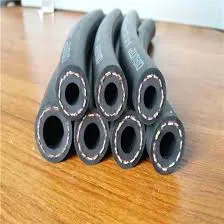Nov . 30, 2024 17:35 Back to list
Understanding the Importance of Clutch Hydraulic Hoses in Automotive Performance
Understanding Clutch Hydraulic Hoses Importance and Maintenance
In the intricate world of automotive engineering, every component plays a critical role in ensuring the smooth operation of vehicles. Among these vital components is the clutch hydraulic hose, a seemingly small yet crucial part of the clutch system in many vehicles. Understanding its function, importance, maintenance, and potential issues can help prolong the life of your vehicle's clutch system and enhance your driving experience.
The Function of a Clutch Hydraulic Hose
The clutch hydraulic hose is an integral part of the hydraulic clutch system, which is typically found in manual transmission vehicles. Its primary function is to transfer hydraulic fluid from the master cylinder to the clutch slave cylinder. When the driver presses the clutch pedal, the master cylinder generates hydraulic pressure that travels through the hose to disengage the clutch fork, allowing for smooth shifting between gears.
This hydraulic mechanism offers several advantages over traditional cable systems, including a more responsive feel and the ability to maintain consistent pressure, which leads to better control of the vehicle’s power transmission.
Importance of the Clutch Hydraulic Hose
The importance of the clutch hydraulic hose cannot be overstated. As a conduit for hydraulic fluid, any damage or wear to the hose can lead to significant problems. A malfunctioning hose can result in fluid leaks, which can reduce hydraulic pressure and ultimately prevent the clutch from disengaging properly. This could cause difficulty in shifting gears, leading to a frustrating driving experience and potential damage to the transmission.
Additionally, a worn-out or damaged hydraulic hose can lead to safety hazards. If the clutch fails unexpectedly while driving, it could result in the inability to control the vehicle effectively, posing risks to the driver and other road users. Thus, maintaining the integrity of the clutch hydraulic hose is essential for both performance and safety.
Maintenance Tips for Clutch Hydraulic Hoses
1. Regular Inspections Routine checks of the hydraulic hose can help identify any signs of wear, cracking, or leaks. Pay close attention to the connections at both the master and slave cylinders, as well as the entire length of the hose for any abnormalities.
clutch hydraulic hose

2. Fluid Replacement Over time, the hydraulic fluid can become contaminated or lose its properties. It’s advisable to follow the manufacturer’s recommendations for fluid replacement to maintain the effectiveness of the clutch system.
3. Watch for Warning Signs Be aware of any changes in your vehicle's performance, such as difficulty in shifting gears or a soft or spongy clutch pedal feel. These can be indicators of problems within the hydraulic system, including issues with the hose.
4. Professional Inspection If you suspect any problems with the clutch system, don’t hesitate to consult a professional mechanic. They can provide a thorough inspection and replace any damaged components, including the hydraulic hose.
Common Problems and Solutions
Even with careful maintenance, clutch hydraulic hoses can fail. Common issues include
- Leaking Fluid A leak can occur at the hose itself or at the connections. If you notice fluid on the ground where you park, investigate further as this can lead to catastrophic failure if left unaddressed.
- Swelling or Softening Exposure to heat and chemicals can cause the hose material to degrade. If you notice the hose appears swollen or discolored, it may be time for a replacement.
- Air in the System If air gets into the hydraulic system, it can cause the clutch to feel spongy. Bleeding the hydraulic system may be necessary to remove air pockets and restore proper function.
Conclusion
The clutch hydraulic hose, while often overlooked, plays a pivotal role in the performance and safety of a vehicle. Proper maintenance and timely replacement can help avoid unnecessary complications and enhance the longevity of the clutch system. By staying vigilant and proactive about the condition of your clutch hydraulic hose, you can ensure smoother gear transitions and a safer driving experience. Always remember, when in doubt, it’s best to consult with a qualified mechanic to address any concerns regarding your vehicle's clutch system.
-
Best Four Steel Wire Spiral Hose Hydraulic R12 – Durable High-Pressure Hose Manufacturer
NewsJul.08,2025
-
High-Quality 1/4 Hydraulic Hose – Soft, Flexible & Durable Rubber Hoses for Industrial Use
NewsJul.08,2025
-
1 1 2 Inch Hydraulic Flexible Hose - Durable, Reliable, High-Pressure Solutions
NewsJul.07,2025
-
High-Quality 1 2 Rubber Hose - Durable, Flexible Hydraulic Solutions
NewsJul.07,2025
-
Discover SAE Hydraulic Hose Types - High Quality & Durable Hoses from Leading Factory Supplier
NewsJul.06,2025
-
High Pressure Wire Hydraulic Rubber Hose Supplier Durable & Reliable 1SN Hose Solutions
NewsJul.06,2025
